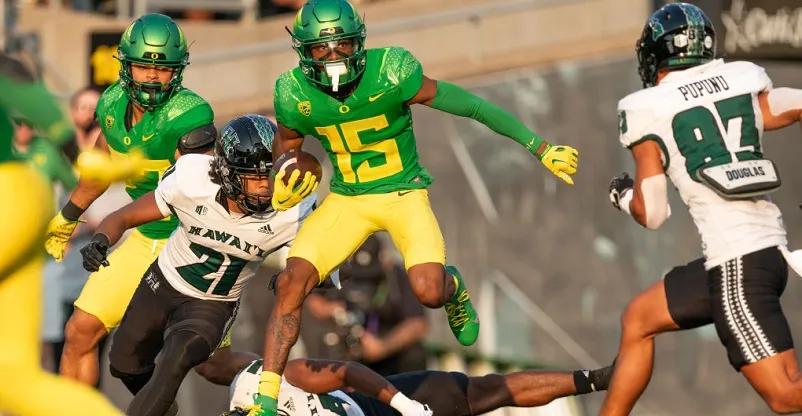•
Written By
Written By
•
•
•
Loading article...
Written By
Written By
Oregon just canceled its game against Hawaii this year. Blame Hawaii’s Stadium all you want, but two other factors are the main culprits.
Written By
Omar-Rashon Borja
Senior Writer, Editor, Historian
Written By
Omar-Rashon Borja
Senior Writer, Editor, Historian

It may be hard to believe, but no one wants to travel to Hawaii. Well, no Power Conference team wants to, at least. After weeks of rumors of the postponement of Oregon's visit to Hawaii, including some talks of the game moving to Las Vegas' Allegiant Stadium, the schools canceled their 2024 meeting.
Oregon will now play a standard 12-game slate and not 13 games. Now, Hawaii is in panic mode, needing to search for a 12th opponent. Getting their customary 13th Hawaii Exemption opponent is the least of their worries now. Oregon's withdrawal from the Hawaii game represents a disturbing path college football may head towards.
At first glance, people will point to Hawaii's tiny Clarence T.C. Ching Complex as the main culprit for the cancellation. The Ching Complex will seat 16,909 for the 2024 season, less than 1000 more than Idaho's Kibbie Dome.
Oregon likely would have brought a significant traveling party to the islands for their first visit since the 1998 Aloha Bowl. The combination of Oregon's brand name and this being their first trip to the islands of the millennium makes it reasonable to believe the game could have drawn at least 30,000 fans if Hawaii played at Aloha Stadium. For reference, USC drew 39,508 to Aloha Stadium in their last game with the Rainbow Warriors in 2013.
While one can consider Ching's tiny capacity as a factor, Hawaii was paying the Ducks a flat rate of $500,000 to appear. Road fan ticket revenue was likely not as significant as people may think. The cancellation comes down to two main factors: The Big Ten and the 12-team Playoff.
Big Ten Equals Big Travel
Travel has always been the talking point with the Big Ten's addition of four PAC-12 schools. In 2024, Oregon will travel 7587 miles on the road, with three trips totaling over 2000 miles. This total is over 3000 miles more than their 2023 total. This sum does not even factor in the return trips to Eugene.
A trip to Hawaii for a 13th game would not have been financially responsible for the Ducks, especially when they will receive a reduced media payout from the Big Ten. Oregon and Washington will initially receive $30 million in Big Ten media revenue, half the amount other Big Ten schools will receiver with yearly $11 million increases until the end of the Big Ten’s media deal according to ESPN and The Inside Zone's Matt Fortuna.
PAC-10/PAC-12 schools were the most frequent guests in Hawaii. The 63 visits accumulated by PAC-12 members is the most of any FBS conference other than the Mountain West, Hawaii’s home. The travel demands of PAC-12 schools were minimal, making occasional trips to Hawaii delightful and feasible. With four former PAC-12 members joining the Big Ten and two others retreating to the ACC, these trips are more of a hassle than a novelty. Oregon’s cancelation also brought another issue to light.
The Decline of the Hawaii Exemption?
The Hawaii Exemption encourages FBS schools to play in Hawaii, allowing them to have a 13th game. The 12-team Playoff makes a 13-game regular season a disadvantage. If Oregon were to play Hawaii, make the Big Ten Championship, and make the College Football Playoff Championship, their season would be 17 or 18 games.
The Hawaii game puts Ducks’ players at a significantly higher risk of entering the Playoff under full strength than the rest of the Playoff field. In the eyes of administrators eternally pursuing the almighty dollar, the money gained from a playoff run is much more valuable than cherished memories from fans on a trip to a distant island.
The 2024 Hawaii-Oregon cancellation is a shame on many levels. Hawaii was once a program and destination that attracted Tom Osborne’s Nebraska Cornhuskers, a Michigan team quarterbacked by Tom Brady, and a Big East Champion Cincinnati for games. These days, a hyper-focus on the College Football Playoff has ruined the novelty of trips to Hawaii.
The biggest losers are Oregon’s players. The Ducks lose a rare trip to Hawaii. Eight players hailing from Hawaii lose a chance for their families to see them play in person. Most notably, it was common knowledge that transfer quarterback Dillon Gabriel was excited to play in his home state for the first time in his college career. Although minor to many, the growing rarity of Power Four games in Hawaii is a sad sign of the new reality of college football.
Oregon will no longer open 2024 season at Hawaii after adding game vs. Oregon State, sources told @ActionNetworkHQ. Oregon & Hawaii have 2 games remaining in 3-game series that is still scheduled, sources said. W/out the Oregon game, Hawaii is seeking at least 1 more game in 2024